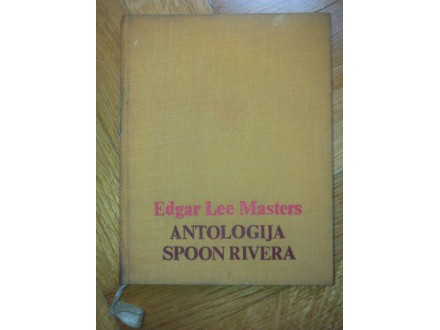Edgar Lee Masters - Antologija Spoon Rivera
| Cena: |
| Stanje: | Polovan sa vidljivim znacima korišćenja |
| Garancija: | Ne |
| Isporuka: | Pošta Post Express Lično preuzimanje |
| Plaćanje: | Tekući račun (pre slanja) Lično |
| Grad: |
Beograd-Vračar, Beograd-Vračar |
Godina izdanja: Ostalo
ISBN: Ostalo
Jezik: Srpski
Autor: Strani
Edgar Lee Masters - Antologija Spoon Rivera
Veselin Maslesa, Sarajevo, 1981.
Tvrd povez, 136 strana, mrlja na spoju prednje korice i rikne, vidi se na slici.
RETKO!
Edgar Lee Masters (August 23, 1868 – March 5, 1950) was an American attorney, poet, biographer, and dramatist. He is the author of Spoon River Anthology, The New Star Chamber and Other Essays, Songs and Satires, The Great Valley, The Serpent in the Wilderness, An Obscure Tale, The Spleen, Mark Twain: A Portrait, Lincoln: The Man, and Illinois Poems. In all, Masters published twelve plays, twenty-one books of poetry, six novels and six biographies, including those of Abraham Lincoln, Mark Twain, Vachel Lindsay, and Walt Whitman.
Born in Garnett, Kansas, to attorney Hardin Wallace Masters and Emma Jerusha Dexter,[2] his father had briefly moved to set up a law practice, then soon moved back to his paternal grandparents` farm near Petersburg in Menard County, Illinois. In 1880 they moved to Lewistown, Illinois, where he attended high school and had his first publication in the Chicago Daily News. The culture around Lewistown, in addition to the town`s cemetery at Oak Hill and the nearby Spoon River, were the inspirations for many of his works, most notably Spoon River Anthology, his most famous and acclaimed work.[3]
He attended Knox Academy in 1889–90, a now defunct preparatory program run by Knox College, but was forced to leave due to his family`s inability to finance his education.[1]
After working in his father`s law office, he was admitted to the Illinois bar and moved to Chicago, where he established a law partnership in 1893 with the law firm of Kickham Scanlan. He married twice. In 1898 he married Helen M. Jenkins, the daughter of Robert Edwin Jenkins, a lawyer in Chicago, and had three children. During his law partnership with Clarence Darrow from 1903 to 1908, Masters defended the poor. In 1911 he started his own law firm, despite three years of unrest (1908–11) caused by extramarital affairs and an argument with Darrow.[citation needed]
Two of his children followed him with literary careers. His daughter Marcia Masters pursued poetry, while his son Hilary Masters became a novelist. Hilary and his half-brother Hardin wrote a memoir of their father.[4]
Masters died in poverty at a nursing home on March 5, 1950, in Melrose Park, Pennsylvania, age 81.[5] He is buried in Oakland cemetery in Petersburg, Illinois. His epitaph includes his poem, `To-morrow is My Birthday` from Toward the Gulf (1918):
`Good friends, let`s to the fields ...
After a little walk, and by your pardon,
I think I`ll sleep. There is no sweeter thing,
Nor fate more blessed than to sleep.
I am a dream out of a blessed sleep –
Let`s walk, and hear the lark.`
Family history
Edgar`s father was Hardin Wallace Masters, whose father was Squire Davis Masters, whose father was Thomas Masters, whose father was Hillery Masters, the son of Robert Masters (born c. 1715, Prince George`s County, Maryland, the son of William W. Masters and wife Mary Veatch Masters). Edgar Lee Masters wrote in his autobiography, Across Spoon River (1936), that his ancestor Hillery Masters was the son of `Knotteley` Masters, but family genealogies show that Hillery and Notley Masters were, in fact, brothers.[6][7]
Masters first published his early poems and essays under the pseudonym Dexter Wallace (after his mother`s maiden name and his father`s middle name) until the year 1903, when he joined the law firm of Clarence Darrow. Masters began developing as a notable American poet in 1914, when he began a series of poems (this time under the pseudonym Webster Ford) about his childhood experiences in Western Illinois, which appeared in Reedy`s Mirror, a St. Louis publication.
In 1915 the series was bound into a volume and re-titled Spoon River Anthology. Years later, he wrote a memorable and invaluable account of the book`s background and genesis, his working methods and influences, as well as its reception by the critics, favorable and hostile, in an autobiographical article notable for its human warmth and general interest.[8]
Although he never matched the success of Spoon River Anthology, he published several other volumes of poems including Book of Verses in 1898, Songs and Sonnets in 1910, The Great Valley in 1916, Song and Satires in 1916, The Open Sea in 1921, The New Spoon River in 1924, Lee in 1926, Jack Kelso in 1928, Lichee Nuts in 1930, Gettysburg, Manila, Acoma in 1930, Godbey, sequel to Jack Kelso in 1931, The Serpent in the Wilderness in 1933, Richmond in 1934, Invisible Landscapes in 1935, The Golden Fleece of California in 1936, Poems of People in 1936, The New World in 1937, and More People in 1939.[citation needed] Two of his later volumes were published by the Decker Press after its founder, James Decker, asked Masters for permission to print his work; Masters agreed and Illinois Poems was published in 1941 and Along the Illinois was released in 1942.[9]
Predmet: 74866469









